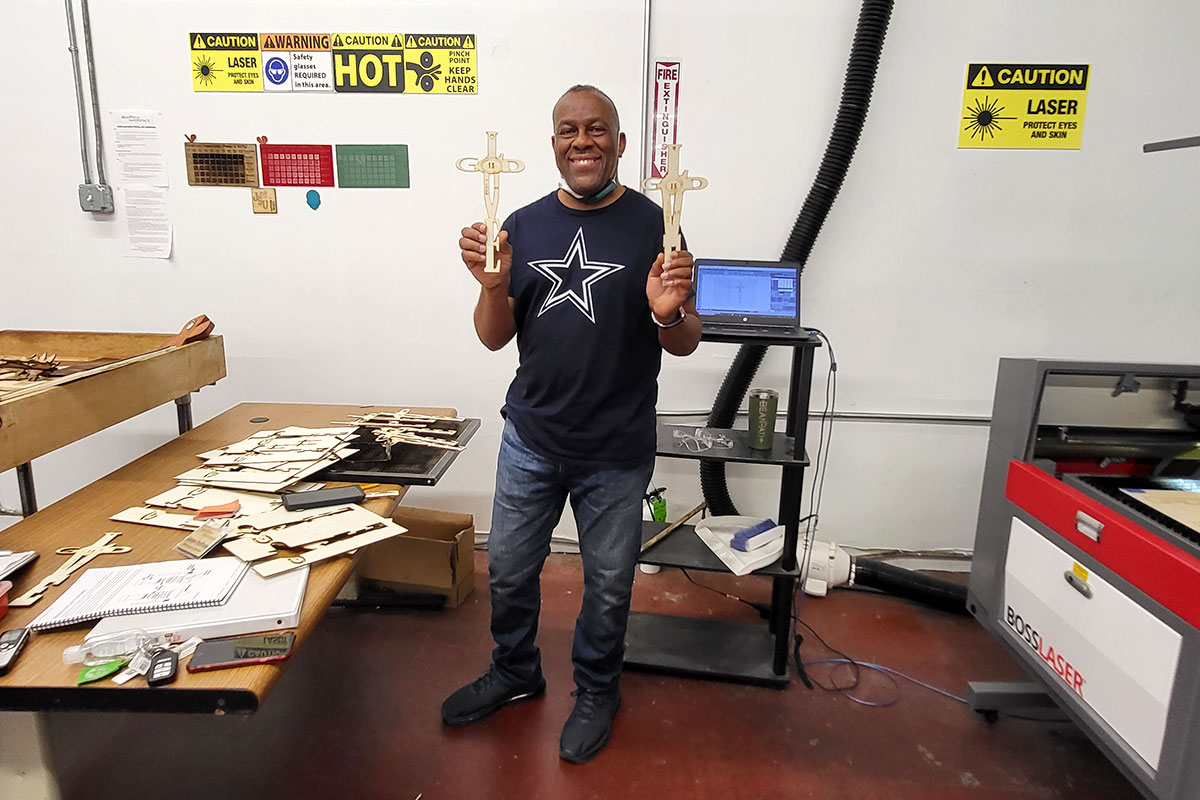JACKSON, Miss.—During a recent day off, Jesse Huffman stationed himself at the laser cutter inside The Bean Path’s Makerspace building off Gallatin Street. Dressed casually in a Dallas Cowboys T-shirt and jeans, along with a green mask over his face, the maintenance technician placed a wooden square inside the machine with blue tape holding the material down for stability. Next to the laser cutter rested a small laptop, where Huffman double-checked his settings—the speed, the size of his stencil and the framing of the laser on the wood.
“You control two different things: the speed and how much power you put on there,” Huffman explained. “You can slow it down to make it burn more, or you can create more power to make it burn. You kind of have to play between your speed and power.”
With the press of a key on the computer, the lid of the machine closed, and it began performing its programmed duties. In less than two minutes, the laser cut out the words “God Is Love,” arranged into the shape of a cross with “God” horizontal and “Love” vertical, the two sections of wood connected through the common letter “O” in the center, which contains the word “Is” sketched out in a lighter color.
Details decorated the creation here and there, like “1 John 4:8” resting on the letter “V.” Burnt outlines from the laser gave the cross a rustic, aged look.
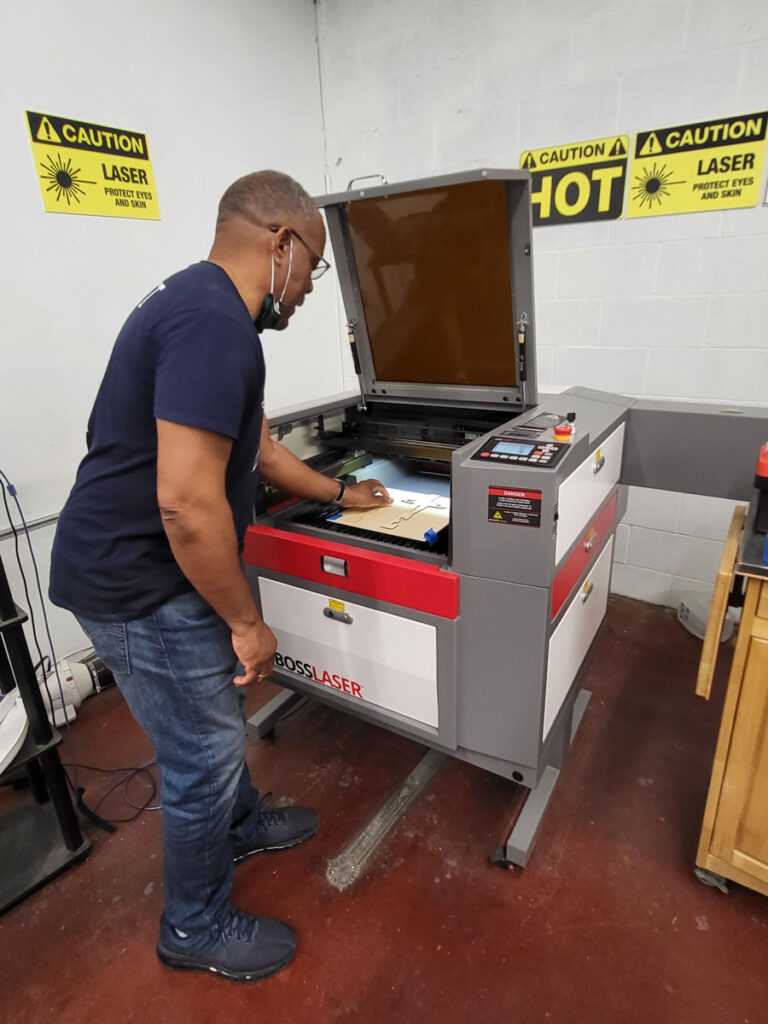
Behind Huffman stood a table full of these cutouts, some smaller than others and some featuring different visual styles. Two years ago, the craftsman designed this stencil and shared his vision with his daughters.
“I told them the same thing I told you; I have seen ‘God Is Love’ on plates, ‘God Is Love’ on cups and stuff like that,” Huffman said. “I would ask them, ‘How can I weld this all together?’ I saw on TV where Howard Ballou was talking about the tech district coming here, and I came down here, and that’s how I saw how to weld it all together.”
The 65-year-old comes to the Makerspace once a week, sometimes twice a week when his work schedule allows. He first visited in September 2022, with Makerspace manager Adam Crowe teaching him how to use the equipment properly. Before operating the machines unsupervised, Huffman would read up on the safety and protocols during his downtime.
“I’m getting to that point of life where I’m getting out of (being a) maintenance technician, and I’m trying to go into that next field,” he told the Mississippi Free Press. “Maybe if I was 30 years younger, I’m not gonna say if I wouldn’t be here or not, but getting ready to get out of a punching-the-clock job, I’m not gonna wait … to figure something out. So, I started looking for something, and the Makerspace really just came around.”
‘Technologists with Ties’
The Bean Path is a nonprofit organization offering technical advice and guidance to individuals and small businesses in the community. Dr. Nashlie Sephus intentionally opened the Makerspace on Gallatin Street in downtown Jackson because she wanted to offer people in the area something to look forward to and in which they could take pride.
“Generally, we try to have some type of focus on people who are doing amazing things that have ties to Mississippi year-round because the whole purpose of the organization is to close the digital divide, increase opportunity (and) increase upward mobility, especially to help people in Jackson,” Bean Path Director of Marketing Angelyn Irvin says.
The Makerspace is a collaborative, community workshop space that is the first operational building of The Bean Path’s 21-acre S.T.E.A.M.—which stands for science, technology, engineering, art and math—hub. The 6,400-square-foot building houses woodcutters, printing presses, 3D printers, sewing machines and more machines.
“Even though this is something happening February 2023, throughout the year, we have conversations with technologists with ties to Mississippi,” Irvin said about the nonprofit’s focus on highlighting Black experts in technology fields last month as part of its year-round tech-talk program.
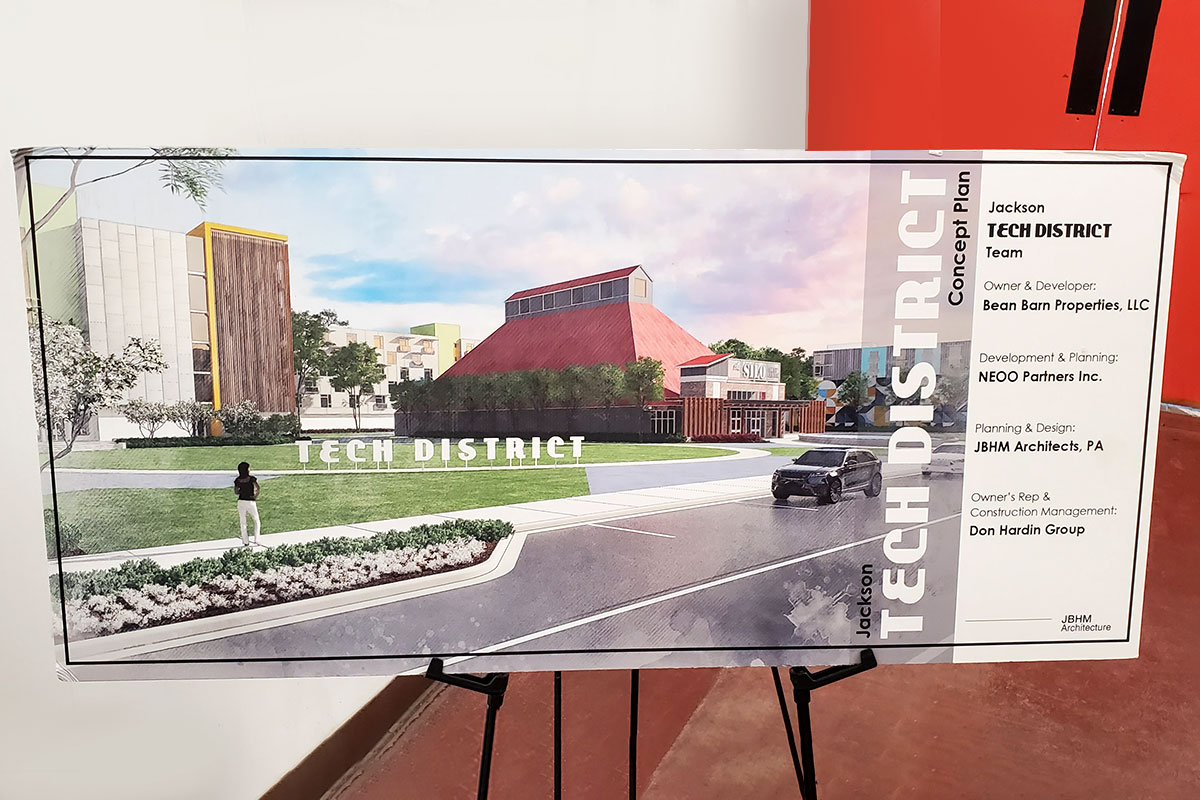
The Bean Path holds these presentations on the second Saturday of each month, with an industry expert discussing a topic pertaining to the tech field. The talks’ new format includes a demonstration relating to what is being discussed.
“We had Dr. Sephus at the Makerspace (on Feb. 11) talking about ChatGPT, which is a new artificial-intelligence chat bot that’s really shaken up the technology space right now,” Irvin explained. “Microsoft has just invested billions of dollars into it. They’re saying it’s going to be the next competitor with Google Search.”
“We invited people to come to the Makerspace (and to) bring their laptops, and they were actually told to open up the software that Dr. Sephus was talking about so they could do a live demonstration, (which) really help(s) people get more familiar and comfortable using the technology,” Irvin said.
In addition to Nashlie Sephus, the nonprofit has hosted Herbert Brown, a self-taught coding instructor from the Mississippi Coding Academies; Marlisa Scott, a student pursuing her doctorate in computer engineering at Jackson State University; Tiffiney Carter-Washington, a regional manager for Microsoft TEALS, a philanthropic program that aims to increase computer-science education in schools; Branden Thornton, who attended Saint Joseph Catholic School and is the senior product designer at Uber; and Krystal Chatman, an instructional technology specialist for Jackson Public Schools.
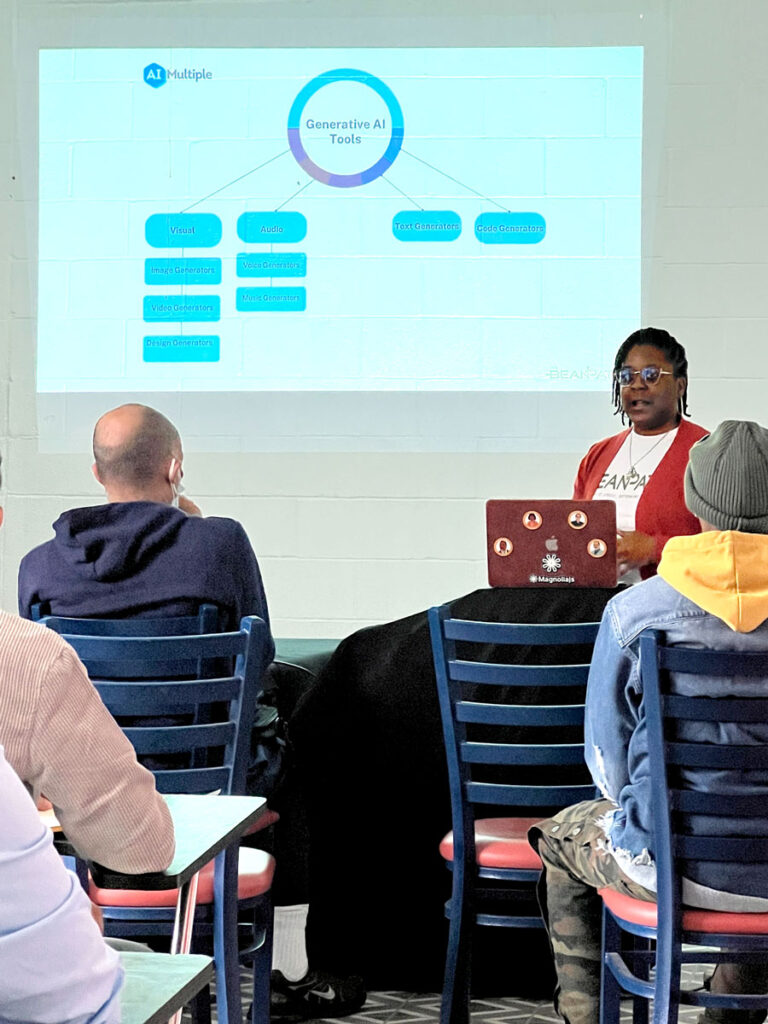
“I think what (the attendees) appreciate most is that we try to actually have some actionable takeaways in all of these conversations,” Irvin told the Mississippi Free Press. “… We try to have very concrete action items that people can implement and actually become employed, entrepreneurs or even if there’s just a side hustle. We want to give people the tools that they need to become innovators.”
“The most amazing thing about technology and the era that we live in right now is that the barriers to entry are almost nonexistent,” Irvin said. “You don’t have to have a degree; you don’t have to have gone to a certain school; you don’t have to be sponsored by an employer. … As long as you have access to the internet, you can find anything you want and create anything you want.”
“I think that there are so many things that have prevented Black people from getting access that now in the age of the internet, it’s so much easier to overcome those barriers because no one knows who you are behind the computer screen,” she added. “So, the possibilities are whatever you make them out to be.”
‘Bridge the Digital Divide’
Stations and equipment line the back walls of the space from one end of the room to the next, while tables and chairs are set up in the middle of the space. At the front of the room where Bean Path Executive Director Kanika Welch stood during a tour, a small stage features a runway jutting out greets visitors.
“So this space has multiple functions,” Welch explained. “It serves as a hub for our after-school programming. We have high schoolers who come in three days a week to learn robotics, fashion design, digital arts. They also learn (to use) technical equipment like the laser cutter.”
The left side of the room features a woodcutting center, where Makerspace manager Adam Crowe trains everyone on how to use the equipment. Students and members can use one of two laser routers to cut wood and make engravings. Heat presses, which can be used for making T-shirts, sit on the tables.
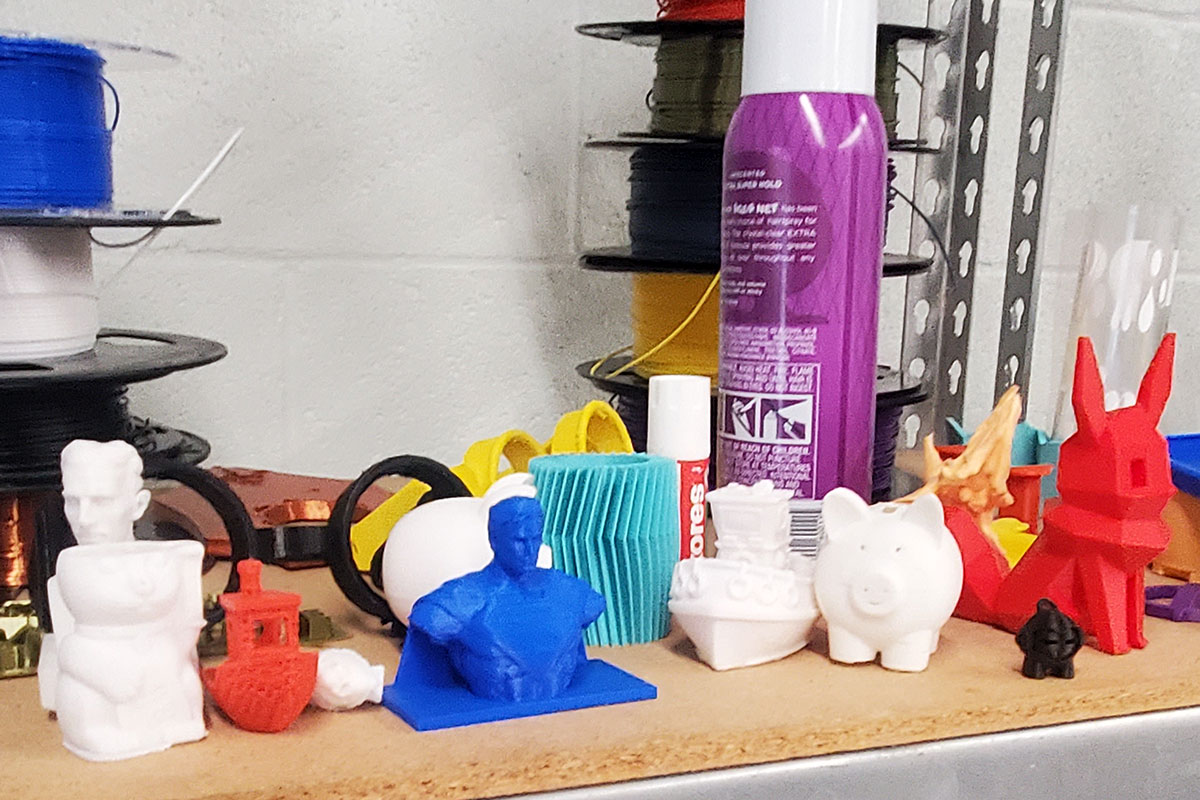
The center houses the 3D printers, which some students have used to make phone cases and miniature figurines and other products like a small, blue boat one of the interns made that Welch notes during the tour. A bin containing jeans made in the Makerspace sits beside the shelf of figurines and printers.
As a gifted student during her high-school days, Welch says she enjoys seeing students have safe spaces to explore, create and to have their ideas encouraged. Parents have praised the Makerspace as well, the executive director adds.
“They want me to stay out of their business,” Welch said. “They’re making movies. When they piloted the summer program, they were making bags and selling them to their friends, making T-shirts and all the things. Our young people are really taken to the videography and fashion-design aspects.”
On a day-to-day basis, interns and paid members come in and use the space and equipment for prototyping or other aspects of their hobbies or professions. People can pay $60 per month for a membership to use the space. Welch says that JPS high-school students have shown excitement when entering the space and using it to flesh out their ideas.
“I met an artist who was using 3D printers; he makes jewelry, earrings and bracelets, so there’s definitely opportunity here,” Welch said. “Being an educator … one of the biggest pieces when we talk about our STEAM program is the exposure to the possibilities.”
“We had one young lady come in, and she was doing embroidery,” the executive director adds. “It was like she had been waiting for an opportunity to explore. She just took to it, so that’s always an amazing moment to see.”
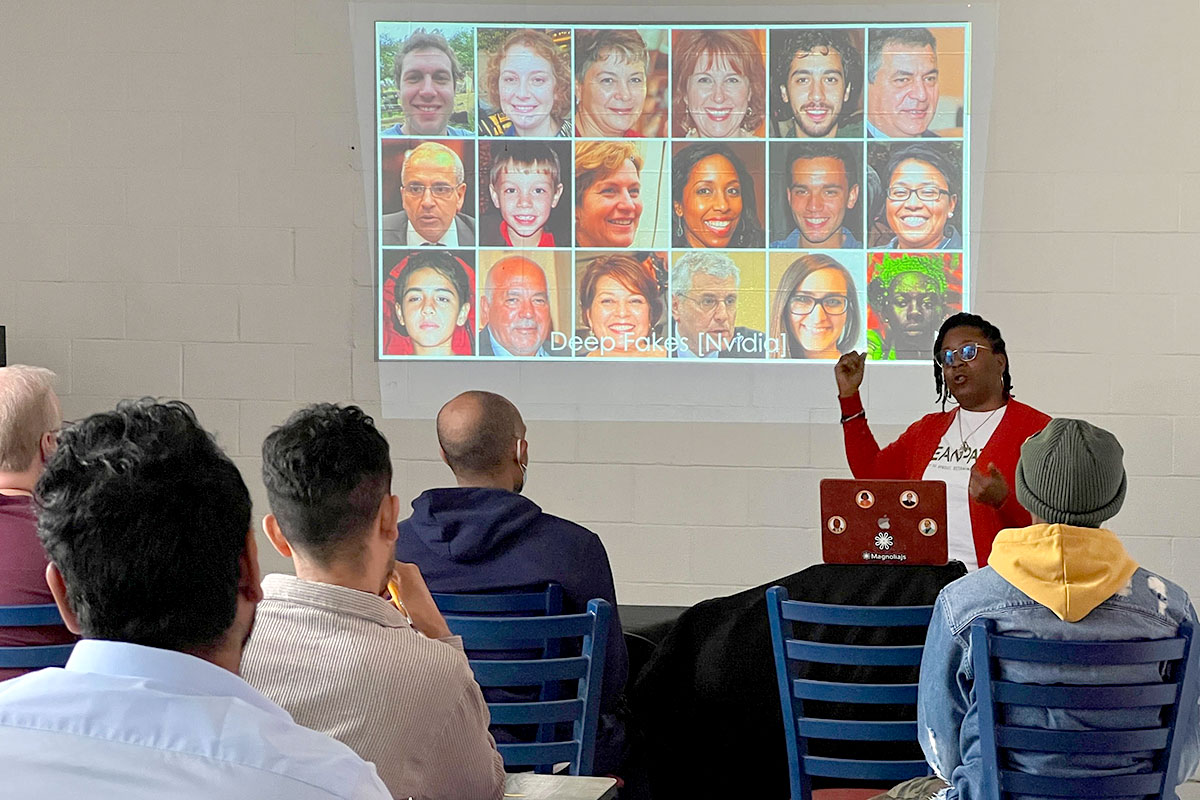
Across the room, a door separates the creator space from the area that hosts the nonprofit’s tech talks. Combination desks line the walls of the room, making it resemble a high-school classroom. During the month of February, it acted as a learning space for The Bean Path’s Black Legacy Month series, which highlighted Black tech experts across the state.
Celebrating Black History Month, the series featured educators from the Mississippi Coding Academies, technologists working with Jackson Public School students and designers with experience at tech companies like Facebook, Twitter and Uber.
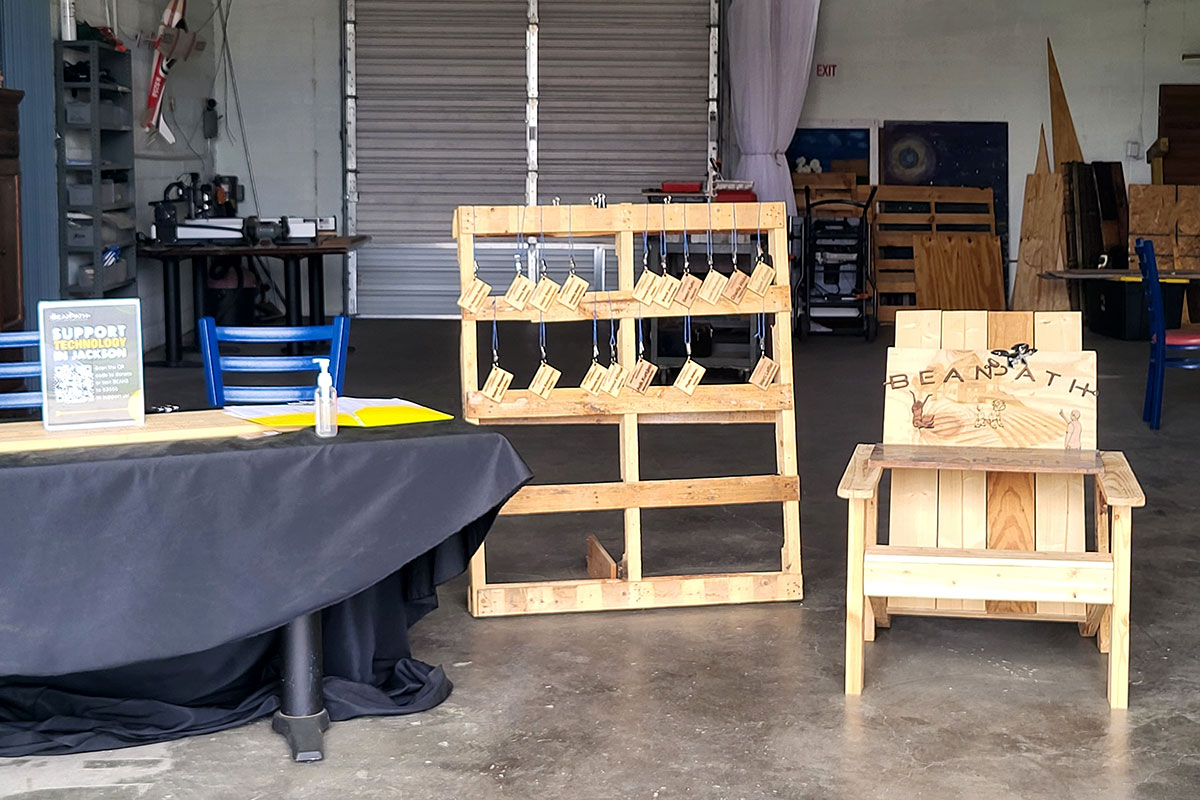
Welch says the Black Legacy Month series was an exciting time because it gave the organization the opportunity to showcase homegrown heroes and to spotlight the immense amount of talent found in the state. Everywhere she has traveled, she always meets someone who has some ties to Mississippi.
“One of my favorite stories is standing at a bus stop in Oslo, Norway, and someone asking me about Margaret Walker,” Welch said. “People in Mississippi have impact all over the world, and this is fertile soil to grow and go.”
The Bean Path is for everybody, Welch insists, expressing her vision of the nonprofit making a national imprint. Though Jackson will remain the hub, the organization is actively seeking ways to expand into places like the Delta, a region that has limited resources, and other parts of the state.
“There was a time when our city was sectioned off, and we had certain people who lived on one side and certain people who lived on the other,” Welch said. “Bean Path is strategically positioned to unite that and bring both sides of the city together in this cultural, technical hub where we equip people with skills and give people resources to do their next best thing: bridge the digital divide.”
‘For Better or Worse’
Angelyn Irvin, who grew up in Jackson, says she often jokes about the idea that Jackson, in her head, is like Wakanda, the fictional African country depicted in Marvel Studios’ film “Black Panther.” Like Wakanda, Irvin claims that Jackson is a place that few think about or know has an abundance of resources, innovators and talent, yet the people here indeed possess the skills and intellect needed to succeed and do not need the outside world’s validation.
“I don’t think it’s about us being featured in Newsweek’s Top 50 Cities to live in in America,” the director of marketing said. “It’s really not about that. It’s about increasing the quality of life for the people who are here. I think that’s what’s really cool about Jackson, for better or for worse, is that it’s not necessarily a community of transplants.”
“It’s a lot of people who are born and raised here, who grew up here, who went to school together, who went to church together, and there’s a sense of community that you don’t find everywhere.”
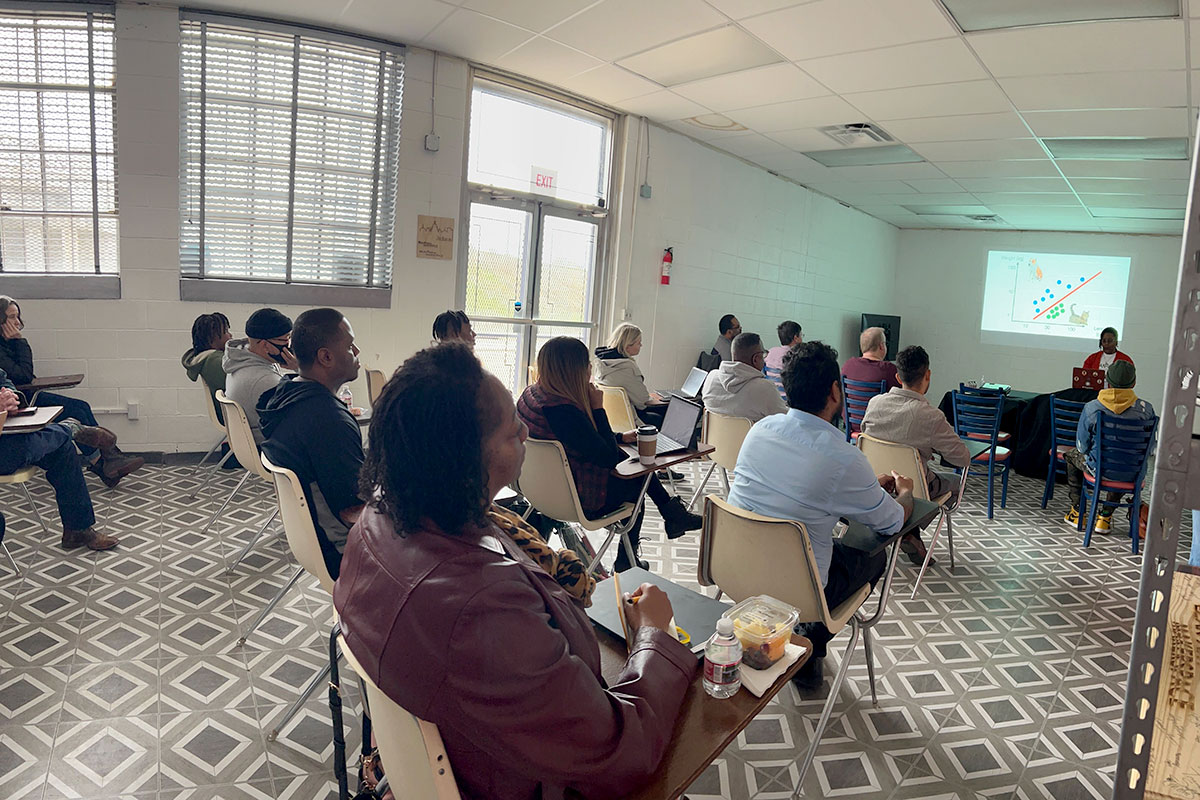
Beyond the Black Legacy Month series, the Makerspace hosts an after-school program for Jackson Public School students, and in April the nonprofit will launch a series of workshops.
The Bean Path does not offer programs specifically designed for senior citizens at the moment, but they are in the process of getting instructors trained on teaching foundational tech concepts to elder Mississippians through a program called O.A.T.S, which stands for Older Adults Technology Services.
“I do think that, in general, older people tend to be more likely to say, ‘That’s not for me; that’s a young folks thing,” Irvin said. “… I would encourage people to come, even if they’re just curious, even if they’re not going to be full-time creators. It’s a good communal resource that’s at your disposal.”
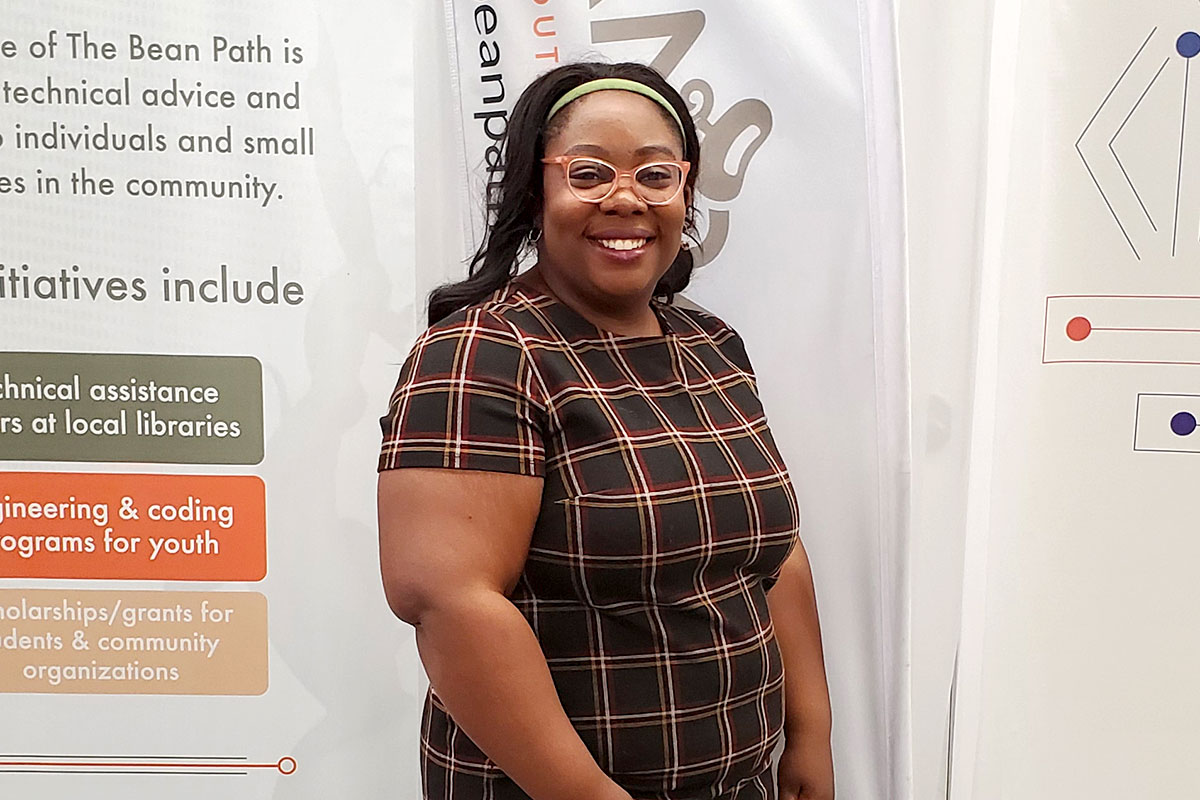
With the emergence of tech in the capital city, Irvin hopes that Jackson becomes a self-sustaining city, that talent in Mississippi feels compelled to stay and that residents can create technology that solves the problems that are unique to Jackson.
“Somebody from Murrah (High School) can figure out how to change the infrastructure that keeps the pipes from bursting, right?” Irvin posited. “I think it’s possible for people from Jackson to solve the problems of Jackson, and once those problems are solved, create a thriving economy that people are excited to live in.”
To learn more about The Bean Path (451 N. Gallatin Street, Jackson) and its mission, visit beanpath.org. Those interested in financially backing the nonprofit to keep its programming running and to expand its scope can donate here. To volunteer, sign up here.

